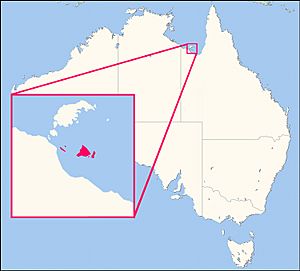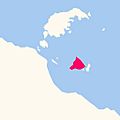South Wellesley Islands facts for kids
Quick facts for kids South Wellesley IslandsQueensland |
|
|---|---|
| Population | 0 (2016 census) |
| • Density | 0/km2 (0/sq mi) |
| Postcode(s) | 4871 |
| Area | 144.2 km2 (55.7 sq mi) |
| Time zone | AEST (UTC+10:00) |
| LGA(s) | Shire of Mornington |
| State electorate(s) | Traeger |
| Federal Division(s) | Kennedy |
The South Wellesley Islands are a group of islands found in the Gulf of Carpentaria in Queensland, Australia. They are part of the Shire of Mornington. In 2016, no people were officially living on these islands.
Contents
Geography of the Islands
The South Wellesley Islands are located in the warm waters of the Gulf of Carpentaria. Here are some of the main islands, listed from west to east:
- Allen Island
- Horseshoe Island
- Albinia Island
- Bentinck Island
- Fowler Island
- Sweers Island
A Look at History
The islands have a rich history, especially for the Kayardild people, who are the traditional owners of this land. Their language, also known as Kaiadilt, is an important part of the culture in the Gulf of Carpentaria region.
Early Challenges on Bentinck Island
Around 1916, a man known as McKenzie came to Bentinck Island. He started a sheep farm. Sadly, during this time, many local Kaiadilt people lost their lives. This difficult period is remembered by the community.
McKenzie later moved to Sweers Island. After he left, the Kaiadilt people were able to return to Sweers Island. Researchers learned about these events in the 1980s.
Moving to Mornington Island
In 1934, Sweers Island was made an Aboriginal reserve, which meant it was set aside for Indigenous people. However, in 1948, a huge storm with a tidal surge hit the area. This happened after a very bad drought in 1946. Because of these tough conditions, the Kaiadilt people were moved by missionaries and the Queensland Government to Mornington Island.
This move was very hard for the Kaiadilt culture and language. Children were kept in dormitories, away from their parents and families. This made it difficult for them to learn their traditional language and stories from older generations.
On Mornington Island, the Kaiadilt people lived in a separate area. They faced challenges with the local Lardil people, who sometimes did not allow them to use the best fishing spots. The living conditions were very tough.
Returning Home
From the late 1960s, the Kaiadilt people slowly began to return to their own islands. This was an important step for them to reconnect with their traditional lands and culture.
 | James B. Knighten |
 | Azellia White |
 | Willa Brown |








